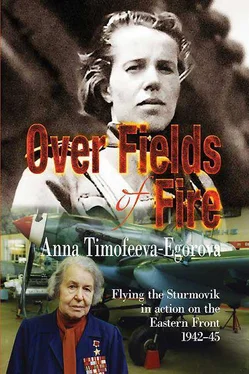I am trying, trying very hard to land the plane as accurately as possible and I manage to do it: the U-2 touches down on three points at the T-point. Our starshina 30 30 Translator’s note — Sergeant-Major.
Khatountsev meets the plane. He has grasped a wing with one hand and is holding the other one raised with the thumb stuck up. In revenge for him making me wash the plane’s tail I stick out my tongue and rev up. The plane speeds up and Vanya runs with all his might accompanying me. And I am so cheerful, my soul rejoices so much, that it seems there is no person in the world happier than me! Having taxied to the parking lot I turn off the engine. Mobbing the plane, the guys ask me some questions, congratulate me, but I rush to report the mission accomplished to the club management. “Well done, Egorova. Keep flying like that”, the flying unit commander said and shook my hand firmly.
That day three from our group flew on their own: Khatountsev, Petukhov and I. After the flight we went to work under the technician’s command and again starshina Khatountsev ‘entrusted’ me with washing the tail unit. I was not angry at him — on the contrary, I took a rag, soap and a bucket of water with pleasure… In the evening during debriefing the instructor declared his gratitude to us but Tougoushy gave us a scolding, “Why do you look only at the instrument board during the flight? Where’s your field of attention? You can’t fly like that! You will smash yourselves up and kill me. Just as I want to hand the controls over to you at landing I look in the mirror and see you looking not at the ground but at the instruments. We are not doing blind flights after all! And you have to act more freely in the air too, you mustn’t tense up and get scared. The plane is reliable!” And he added, laughing, “History knows a case when a U-2 took off and landed with no pilot.”
We all laugh and again Miroevskiy patiently tells us about flying a circle, shows the route on a mock-up, draws it on the blackboard and then asks Tougoushy to repeat everything. The trainee pilot repeats everything sensibly — after all, he’s got degree in engineering — but during the next flight he watches the instruments again. The instructor makes him train on the ground, in the plane cockpit, and then finally the penny drops. Soon after that Tougoushy would catch up with us.
By the end of July when we had all begun flying on our own they suggested we take leave from work and go to camp, to an aerodrome. They made no obstacles for me at the shaft. On the contrary, our Comsomol leader Zhenya kept holding me up as an example at all the meetings, “These are dreadful, bleak times. The clouds of war are coming from the West. Imperialism, riding on a strengthened Fascism, is preparing an attack on our Soviet country!” he would say wrathfully and urging the guys to join the OSOAVIAHIM and pick up military skills. Many of the girls and guys answered the call. Alesha Ryazanov, a metalworker from our shaft’s mechanical workshop, was among them. Running a bit ahead I’ll say that Alesha would graduate from an aeroclub, then the Borisoglebsk military school for fighter pilots, and open his combat account of shot-down Fascist planes on the first day of the war. Ryazanov would defend the skies of Moscow, Stalingrad, Kuban’ 31 31 Translator’s note — a province in Southern Russia.
, the Pribaltika 32 32 Translator’s note — a common Russian name for the Baltic countries.
. Our fellow Metrostroy worker would become Twice Hero of the Soviet Union… 33 33 Editor’s note — with 31 or 32 personal and 16 shared victories.
I quickly booked my vacation and, having received my holiday pay, sent almost everything to the village, for my mother, having written in my letter that I would be going to camp. I didn’t explain what kind of camp it was.
They set up an army-like daily routine for us in the camps. It would be reveille, physical exercises, cleaning up the tents, breakfast if flights were planned for the second shift. If they were to be in the first shift, reveille would be before dawn and commencement of flying, at dawn. Soon we had all worked on our circle flying and started on the most interesting thing, aerobatics. Again we studied the ‘Flight Operations Manual’ which says the aim of learning aerial stunts is to teach the pilot to use the flying characteristics of a plane fully. This helps to master perfectly the art of manoeuvring the plane, necessary for a pilot in combat. But we were still doing our ‘aerobatics’ on the ground. The instructor Miroevskiy would hold a model plane in his hands and analyse with us all the elements of flying: where to look, what to see, how to operate the rudders and elevators, not just which way, but how fast and how far to move them. “Egorova”, he asks me, “what kind of manouvre is a ‘dead loop’?”
“A ‘loop’”, I reply, “is a closed circle in the vertical plane.”
“Good girl. Sit down”, Miroevskiy encourages me and then jokingly addresses Petoukhov: “And what the hell is a ‘spin’?”
Ivan gets up with dignity, tucks in his overalls behind the back, stands to attention, his grey eyes light up, and he begins, “A ‘spin’ is a quick rotation of the plane along a steep descending spiral. It occurs during loss of speed by a plane. The ‘spin’ as an aerial stunt has no independent significance but is mandatory for all flying personnel during training.”
“Tougoushy! What do you know about the ‘barrel-roll’?” Miroevskiy asks.
“It’s a double flip over a wing in the horizontal plane. Exit is in the direction of entry”, the student-pilot raps out in one breath, “but it’s impossible to do a ‘barrel-roll’ on our U-2 — its speed is too low.”
Tougoushy has changed since he’d learned how to fly. When his flying wasn’t going well he walked gloomily, without a smile, and even his dark eyes seemed mud-coloured. But now Tougoushy shines, comes to the aerodrome in a white shirt and tie. His grey cloth OSOAVIAHIM suit is thoroughly ironed, the shoes are polished and not even the aerodrome dust settles on them. His face is clean-shaven, his eyes sparkling! We have begun to call him “Prince of Georgia” among ourselves.
“And how is the ‘Immelman’ carried out, Koutov?” The instructor questions solicitously.
Victor Koutov, a brown-eyed chap with a face as tender a girl’s, demonstrates the order of implementation of this complicated manouevre. Victor works at a Metrostroy marble factory and studies at college in the evening. He is fond of reading, writes poetry and collects books. He usually buys them in two copies: one for himself and one for me. But I have no room to store books and I hand them over to the shaft library. Sometimes I come across hand-written verses in a book presented to me: they are written by Victor. I take the sheet of verses out of the book with care, and when there is no one around I read and re-read them and put into my hand-bag. Then, in the dormitory I hide them deep in my secret casket…
And that was theory, independent circle flying and ground drilling done. We have already been allowed into the ‘zone’, to practise aerobatics. Sharp turns, loops and spins, from fascinating terms in our textbooks, are becoming real indicators of our skills. And we fiercely strive further — strive to master aircraft navigation as well as possible. At this time Victor Koutov and Tougoushy became my permanent companions and tried to sit at the same table with me even in the dry mess. I liked Victor but didn’t like Tougoushy although he was doing his best to win me over. He even tried flattering me: “Anya, it’s as if you were born in a plane, I’m even jealous. First time you flew on your own, and you got no critical remarks. How could there be? — the plane in your hands is like a trained horse. But it doesn’t obey me at all!” I said nothing, and what could I say? Now if Victor had told me that… We all were in good spirits and an elevated mood: every day we were discovering something new for ourselves. One would constantly hear, “You know, I nearly broke into a spin doing a loop!”
Читать дальше












